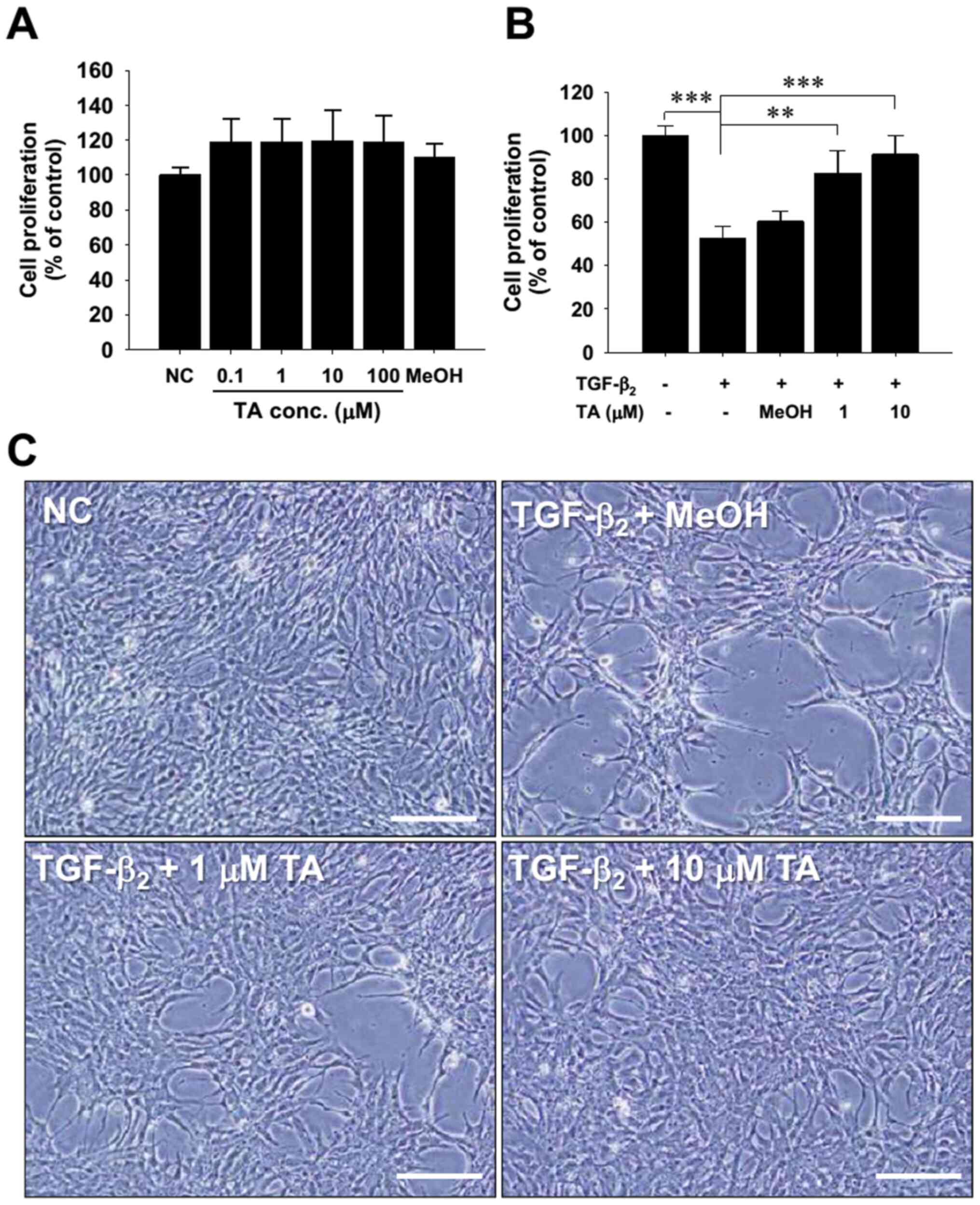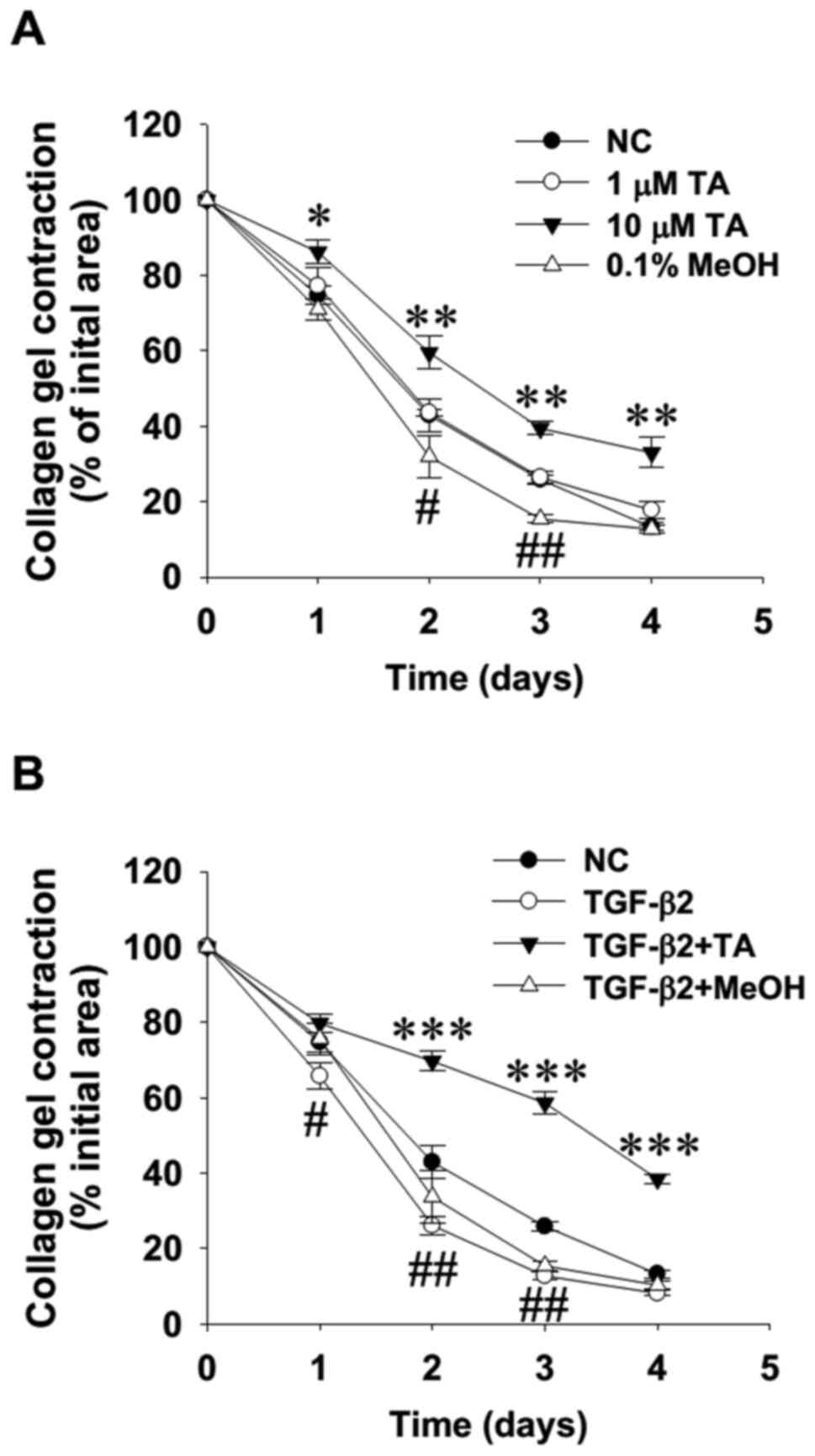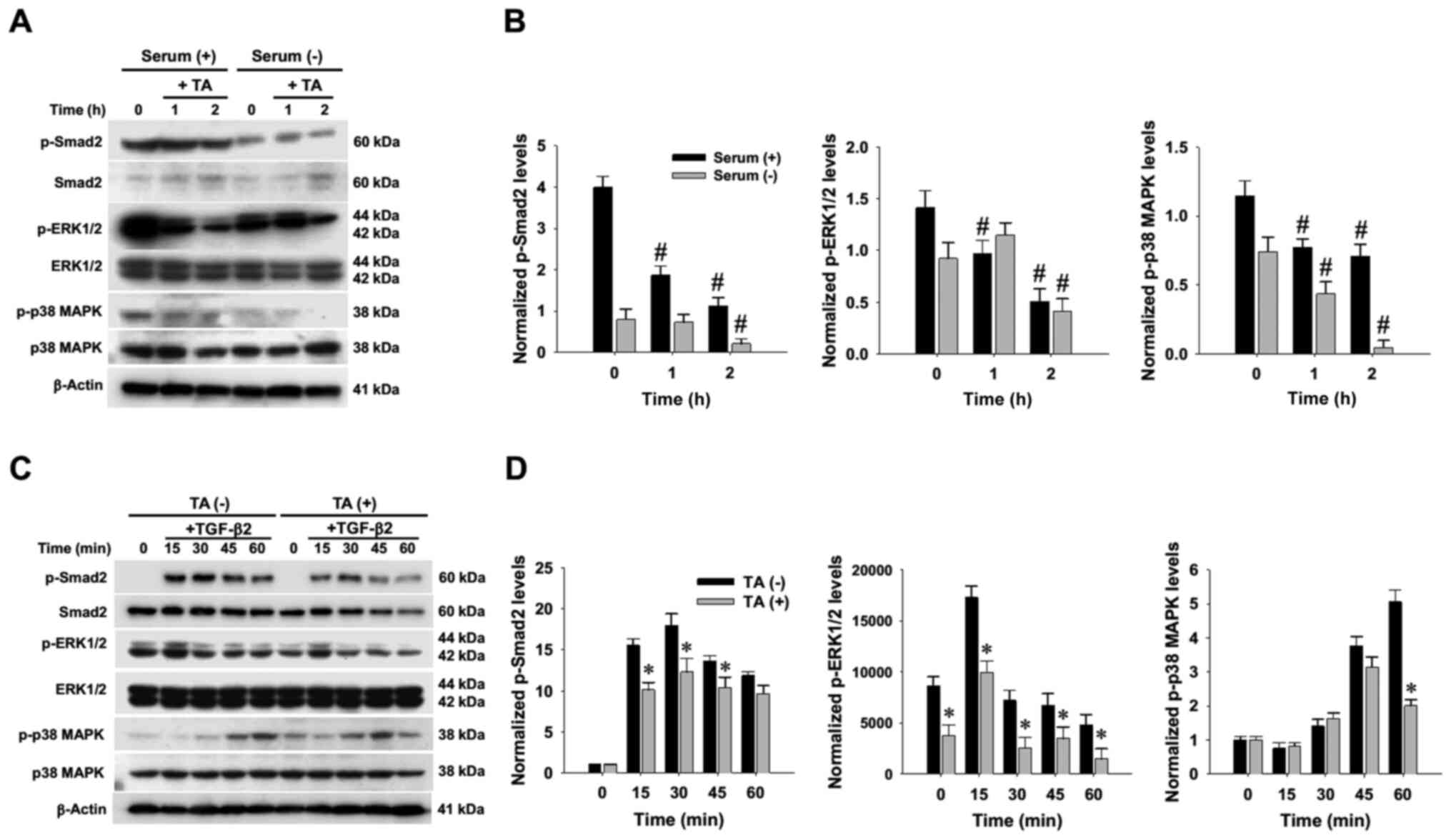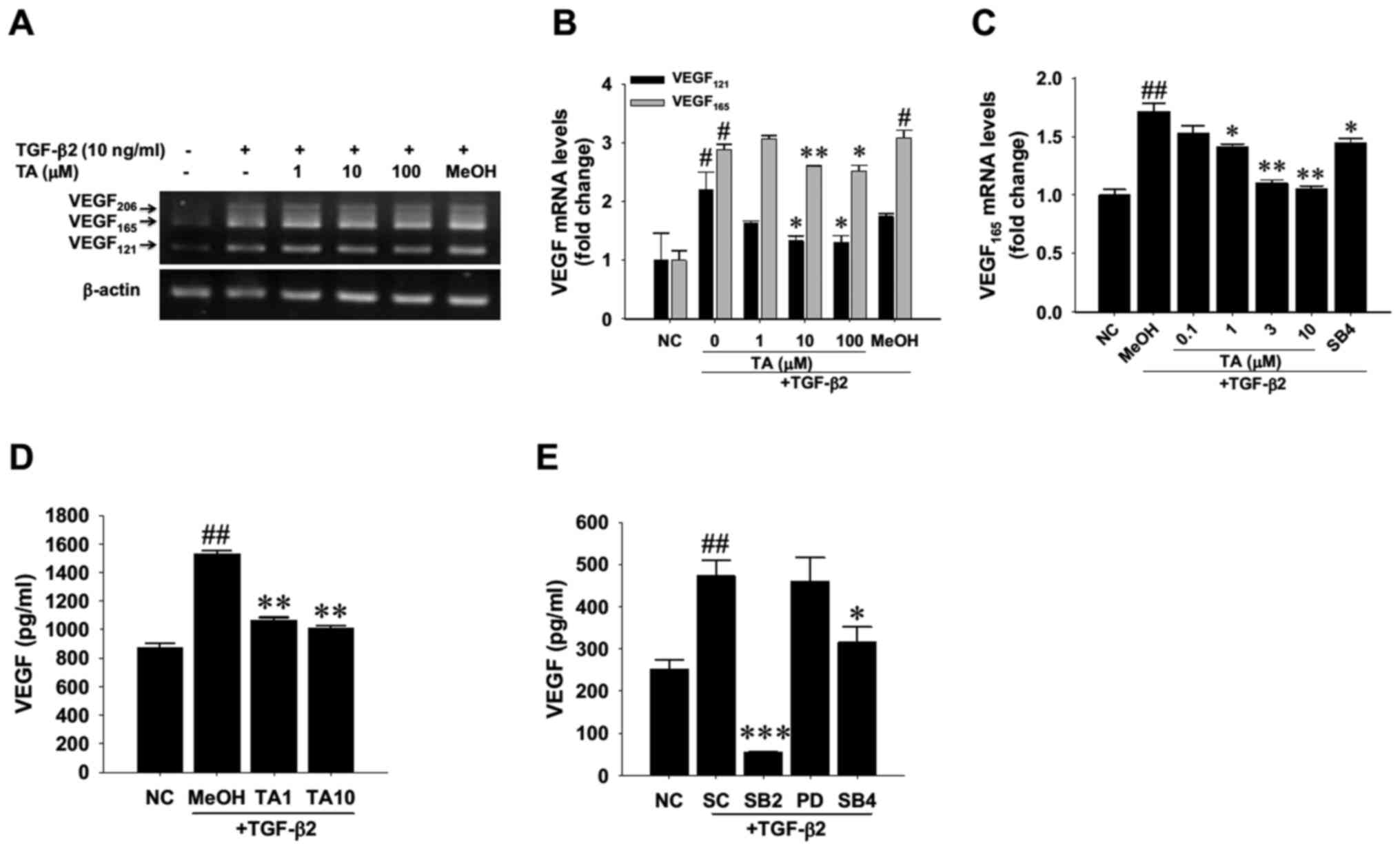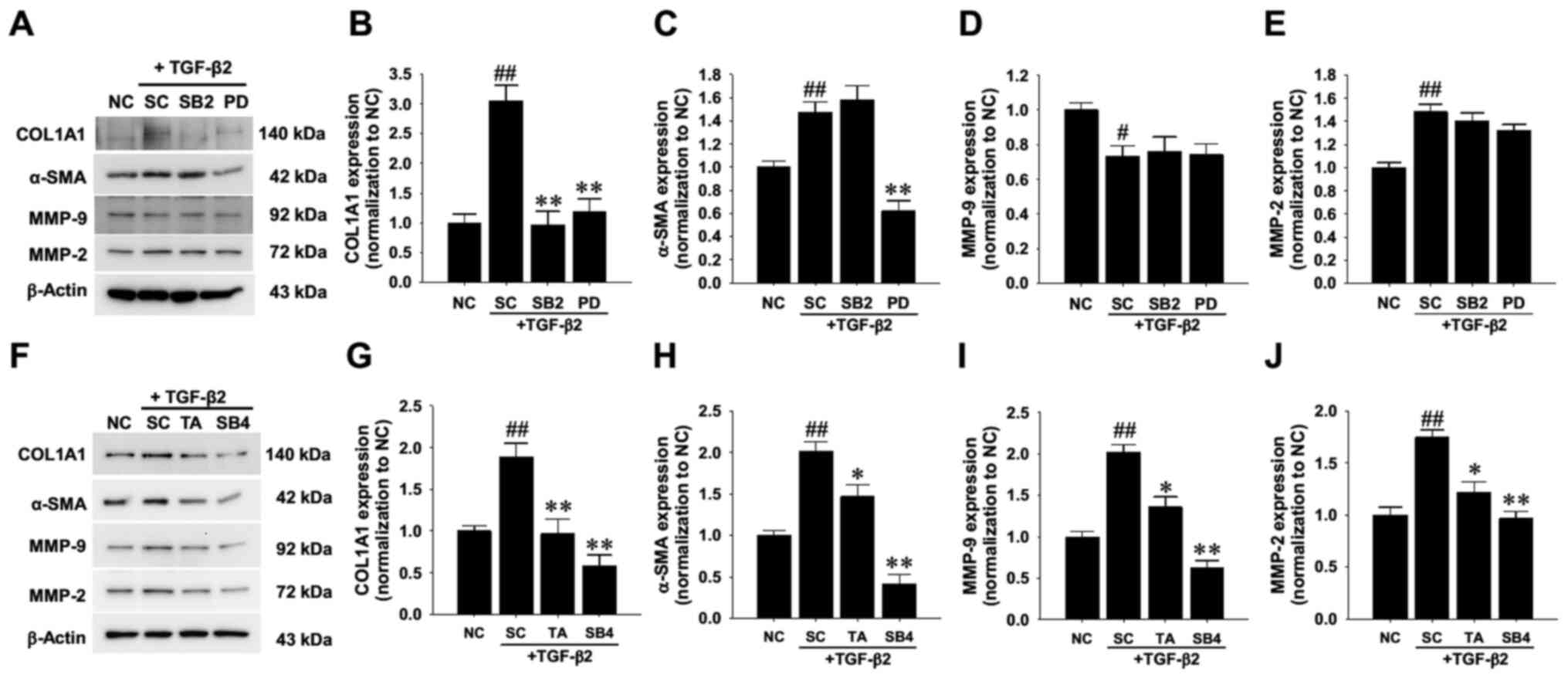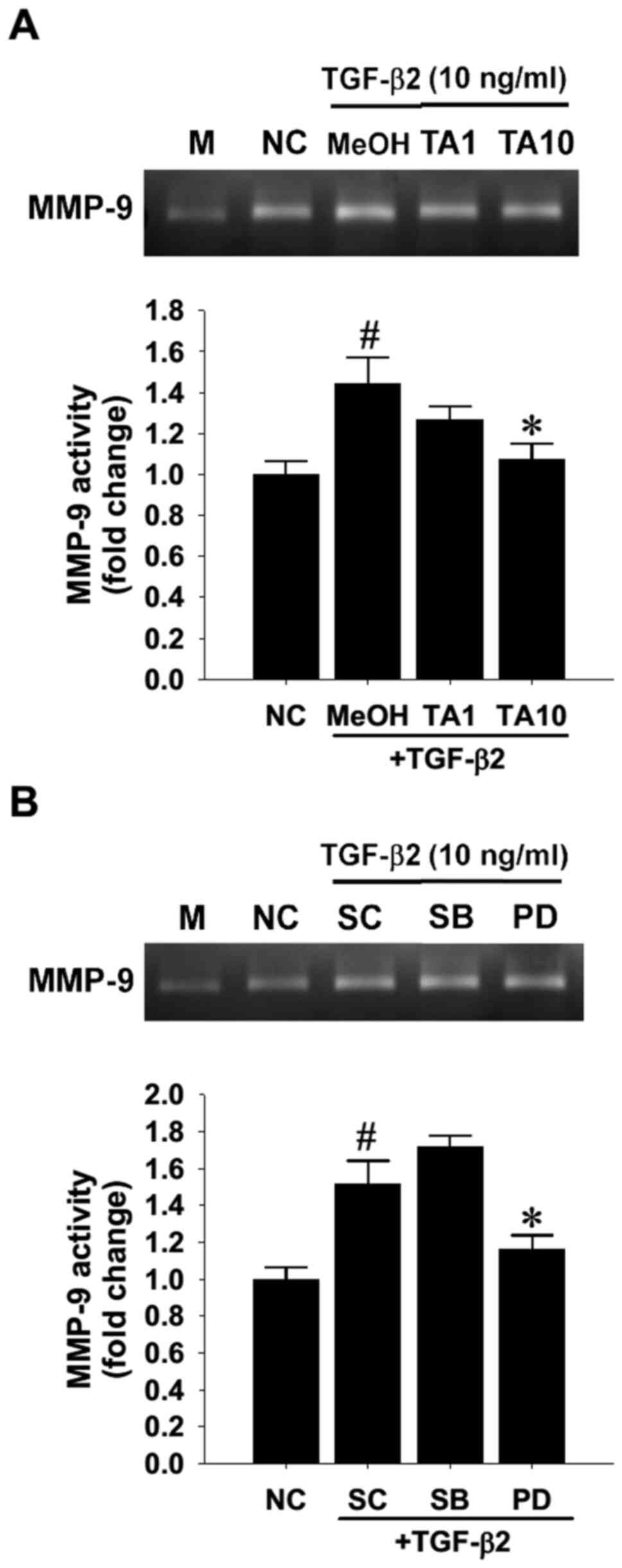|
1
|
Nomura M, Yamagishi S, Harada S, Hayashi
Y, Yamashima T, Yamashita J and Yamamoto H: Possible participation
of autocrine and paracrine vascular endothelial growth factors in
hypoxia-induced proliferation of endothelial cells and pericytes. J
Biol Chem. 270:28316–28324. 1995. View Article : Google Scholar : PubMed/NCBI
|
|
2
|
Schlingemann RO: Role of growth factors
and the wound healing response in age-related macular degeneration.
Graefes Arch Clin Exp Ophthalmol. 242:91–101. 2004. View Article : Google Scholar : PubMed/NCBI
|
|
3
|
Kijlstra A, La Heij E and Hendrikse F:
Immunological factors in the pathogenesis and treatment of
age-related macular degeneration. Ocul Immunol Inflamm. 13:3–11.
2005. View Article : Google Scholar : PubMed/NCBI
|
|
4
|
Henkind P: Ocular neovascularization. The
Krill memorial lecture. Am J Ophthalmol. 85:287–301. 1978.
View Article : Google Scholar : PubMed/NCBI
|
|
5
|
Campochiaro PA: Retinal and choroidal
neovascularization. J Cell Physiol. 184:301–310. 2000. View Article : Google Scholar : PubMed/NCBI
|
|
6
|
Pournaras CJ, Miller JW, Gragoudas ES,
Husain D, Munoz JL, Tolentino MJ, Kuroki M and Adamis AP: Systemic
hyperoxia decreases vascular endothelial growth factor gene
expression in ischemic primate retina. Arch Ophthalmol.
115:1553–1558. 1997. View Article : Google Scholar : PubMed/NCBI
|
|
7
|
Aiello LP, Avery RL, Arrigg PG, Keyt BA,
Jampel HD, Shah ST, Pasquale LR, Thieme H, Iwamoto MA, Park JE, et
al: Vascular endothelial growth factor in ocular fluid of patients
with diabetic retinopathy and other retinal disorders. N Engl J
Med. 331:1480–1487. 1994. View Article : Google Scholar : PubMed/NCBI
|
|
8
|
Enzmann V, Hollborn M, Wiedemann P and
Kohen L: Minor influence of the immunosuppressive cytokines IL-10
and TGF-beta on the proliferation and apoptosis of human retinal
pigment epithelial (RPE) cells in vitro. Ocul Immunol Inflamm.
9:259–266. 2001. View Article : Google Scholar : PubMed/NCBI
|
|
9
|
Kishi H, Kuroda E, Mishima HK and
Yamashita U: Role of TGF-beta in the retinoic acid-induced
inhibition of proliferation and melanin synthesis in chick retinal
pigment epithelial cells in vitro. Cell Biol Int. 25:1125–1129.
2001. View Article : Google Scholar : PubMed/NCBI
|
|
10
|
Esser P, Heimann K, Bartz-schmidt KU,
Fontana A, Schraermeyer U, Thumann G and Weller M: Apoptosis in
proliferative vitreoretinal disorders: Possible involvement of
TGF-beta-induced RPE cell apoptosis. Exp Eye Res. 65:365–378. 1997.
View Article : Google Scholar : PubMed/NCBI
|
|
11
|
Mitsuhiro MR, Eguchi S and Yamashita H:
Regulation mechanisms of retinal pigment epithelial cell migration
by the TGF-beta superfamily. Acta Ophthalmol Scand. 81:630–638.
2003. View Article : Google Scholar : PubMed/NCBI
|
|
12
|
Eichler W, Friedrichs U, Thies A, Tratz C
and Wiedemann P: Modulation of matrix metalloproteinase and TIMP-1
expression by cytokines in human RPE cells. Invest Ophthalmol Vis
Sci. 43:2767–2773. 2002.PubMed/NCBI
|
|
13
|
Itoh Y, Kimoto K, Imaizumi M and Nakatsuka
K: Inhibition of RhoA/Rho-kinase pathway suppresses the expression
of type I collagen induced by TGF-beta2 in human retinal pigment
epithelial cells. Exp Eye Res. 84:464–472. 2007. View Article : Google Scholar : PubMed/NCBI
|
|
14
|
Hirase K, Ikeda T, Sotozono C, Nishida K,
Sawa H and Kinoshita S: Transforming growth factor beta2 in the
vitreous in proliferative diabetic retinopathy. Arch Ophthalmol.
116:738–741. 1998. View Article : Google Scholar : PubMed/NCBI
|
|
15
|
Yu AL, Fuchshofer R, Kook D, Kampik A,
Bloemendal H and Welge-Lüssen U: Subtoxic oxidative stress induces
senescence in retinal pigment epithelial cells via TGF-beta
release. Invest Ophthalmol Vis Sci. 50:926–935. 2009. View Article : Google Scholar : PubMed/NCBI
|
|
16
|
Lee SC, Seong GJ, Kim SH and Kwon OW:
Synthesized TGF-beta s in RPE regulates cellular proliferation.
Korean J Ophthalmol. 13:16–24. 1999. View Article : Google Scholar : PubMed/NCBI
|
|
17
|
Matsumoto M, Yoshimura N and Honda Y:
Increased production of transforming growth factor-beta 2 from
cultured human retinal pigment epithelial cells by
photocoagulation. Invest Ophthalmol Vis Sci. 35:4245–4252.
1994.PubMed/NCBI
|
|
18
|
Nagineni CN, Samuel W, Nagineni S,
Pardhasaradhi K, Wiggert B, Detrick B and Hooks JJ: Transforming
growth factor-beta induces expression of vascular endothelial
growth factor in human retinal pigment epithelial cells:
Involvement of mitogen-activated protein kinases. J Cell Physiol.
197:453–462. 2003. View Article : Google Scholar : PubMed/NCBI
|
|
19
|
Bian ZM, Elner SG and Elner VM: Regulation
of VEGF mRNA expression and protein secretion by TGF-beta2 in human
retinal pigment epithelial cells. Exp Eye Res. 84:812–822. 2007.
View Article : Google Scholar : PubMed/NCBI
|
|
20
|
Bian ZM, Elner SG and Elner VM:
Thrombin-induced VEGF expression in human retinal pigment
epithelial cells. Invest Ophthalmol Vis Sci. 48:2738–2746. 2007.
View Article : Google Scholar : PubMed/NCBI
|
|
21
|
Kurosaka D, Muraki Y, Inoue M and Katsura
H: TGF-beta 2 increases alpha-smooth muscle actin expression in
bovine retinal pigment epithelial cells. Curr Eye Res.
15:1144–1147. 1996. View Article : Google Scholar : PubMed/NCBI
|
|
22
|
Zhang YE: Non-Smad pathways in TGF-beta
signaling. Cell Res. 19:128–139. 2009. View Article : Google Scholar : PubMed/NCBI
|
|
23
|
Mu Y, Gudey SK and Landström M: Non-Smad
signaling pathways. Cell Tissue Res. 347:11–20. 2012. View Article : Google Scholar : PubMed/NCBI
|
|
24
|
Ando N, Sen HA, Berkowitz BA, Wilson CA
and de Juan E Jr: Localization and quantitation of blood-retinal
barrier breakdown in experimental proliferative vitreoretinopathy.
Arch Ophthalmol. 112:117–122. 1994. View Article : Google Scholar : PubMed/NCBI
|
|
25
|
Penfold PL, Wen L, Madigan MC, Gillies MC,
King NJ and Provis JM: Triamcinolone acetonide modulates
permeability and intercellular adhesion molecule-1 (ICAM-1)
expression of the ECV304 cell line: Implications for macular
degeneration. Clin Exp Immunol. 121:458–465. 2000. View Article : Google Scholar : PubMed/NCBI
|
|
26
|
Penfold PL, Wen L, Madigan MC, King NJ and
Provis JM: Modulation of permeability and adhesion molecule
expression by human choroidal endothelial cells. Invest Ophthalmol
Vis Sci. 43:3125–3130. 2002.PubMed/NCBI
|
|
27
|
Khairallah M, Zeghidi H, Ladjimi A, Yahia
SB, Attia S, Zaouali S and Messaoud R: Primary intravitreal
triamcinolone acetonide for diabetic massive macular hard exudates.
Retina. 25:835–839. 2005. View Article : Google Scholar : PubMed/NCBI
|
|
28
|
Jonas JB, Kreissig I and Degenring R:
Intravitreal triamcinolone acetonide for treatment of intraocular
proliferative, exudative, and neovascular diseases. Prog Retin Eye
Res. 24:587–611. 2005. View Article : Google Scholar : PubMed/NCBI
|
|
29
|
Witmer AN, Vrensen GF, Van Noorden CJ and
Schlingemann RO: Vascular endothelial growth factors and
angiogenesis in eye disease. Prog Retin Eye Res. 22:1–29. 2003.
View Article : Google Scholar : PubMed/NCBI
|
|
30
|
Matsuda S, Gomi F, Oshima Y, Tohyama M and
Tano Y: Vascular endothelial growth factor reduced and connective
tissue growth factor induced by triamcinolone in ARPE19 cells under
oxidative stress. Invest Ophthalmol Vis Sci. 46:1062–1068. 2005.
View Article : Google Scholar : PubMed/NCBI
|
|
31
|
Edelman JL, Lutz D and Castro MR:
Corticosteroids inhibit VEGF-induced vascular leakage in a rabbit
model of blood-retinal and blood-aqueous barrier breakdown. Exp Eye
Res. 80:249–258. 2005. View Article : Google Scholar : PubMed/NCBI
|
|
32
|
Hollborn M, Stathopoulos C, Steffen A,
Wiedemann P, Kohen L and Bringmann A: Positive feedback regulation
between MMP-9 and VEGF in human RPE cells. Invest Ophthalmol Vis
Sci. 48:4360–4367. 2007. View Article : Google Scholar : PubMed/NCBI
|
|
33
|
Dot C, Behar-Cohen F, BenEzra D, Doat M,
Jonet L, May F and Jeanny JC: Influence of triamcinolone
intravitreal injection on retinochoroidal healing processes. Exp
Eye Res. 84:1081–1089. 2007. View Article : Google Scholar : PubMed/NCBI
|
|
34
|
Wu WC, Kao YH and Hu DN: Relationship
between outcome of proliferative vitreoretinopathy and results of
tissue culture of excised preretinal membranes. Kaohsiung J Med
Sci. 16:614–619. 2000.PubMed/NCBI
|
|
35
|
Gentile RC, Hu DN and McCormick SA: Cell
culture of retinal membranes from proliferative vitreoretinopathy
and age-related macular degeneration. Invest Ophthalmol Vis Sci.
37:S3871996.
|
|
36
|
Wu WC, Kao YH, Hu PS and Chen JH:
Geldanamycin, a HSP90 inhibitor, attenuates the hypoxia-induced
vascular endothelial growth factor expression in retinal pigment
epithelium cells in vitro. Exp Eye Res. 85:721–731. 2007.
View Article : Google Scholar : PubMed/NCBI
|
|
37
|
Committee for the Update of the Guide for
the Care and Use of Laboratory Animals, . Guide for the Care and
Use of Laboratory Animals. The National Academies Press (US);
Washington, DC: 1996
|
|
38
|
Tsai MS, Lee PH, Sun CK, Chiu TC, Lin YC,
Chang IW, Chen PH and Kao YH: Nerve growth factor upregulates
sirtuin 1 expression in cholestasis: A potential therapeutic
target. Exp Mol Med. 50:e4262018. View Article : Google Scholar : PubMed/NCBI
|
|
39
|
Chang YC, Kao YH, Hu DN, Tsai LY and Wu
WC: All-trans retinoic acid remodels extracellular matrix and
suppresses laminin-enhanced contractility of cultured human retinal
pigment epithelial cells. Exp Eye Res. 88:900–909. 2009. View Article : Google Scholar : PubMed/NCBI
|
|
40
|
Chang YC, Lin CW, Chang YS, Chen PH, Li
CY, Wu WC and Kao YH: Monounsaturated oleic acid modulates
autophagy flux and upregulates angiogenic factor production in
human retinal pigment epithelial ARPE-19 cells. Life Sci.
259:1183912020. View Article : Google Scholar : PubMed/NCBI
|
|
41
|
Livak KJ and Schmittgen TD: Analysis of
relative gene expression data using real-time quantitative PCR and
the 2(-Delta Delta C(T)) Method. Methods. 25:402–408. 2001.
View Article : Google Scholar : PubMed/NCBI
|
|
42
|
Kao YH, Jawan B, Goto S, Pan MC, Lin YC,
Sun CK, Hsu LW, Tai MH, Cheng YF, Nakano T, et al: Serum factors
potentiate hypoxia-induced hepatotoxicity in vitro through
increasing transforming growth factor-beta1 activation and release.
Cytokine. 47:11–22. 2009. View Article : Google Scholar : PubMed/NCBI
|
|
43
|
Chang YS, Wu CL, Tseng SH, Kuo PY and
Tseng SY: Cytotoxicity of triamcinolone acetonide on human retinal
pigment epithelial cells. Invest Ophthalmol Vis Sci. 48:2792–2798.
2007. View Article : Google Scholar : PubMed/NCBI
|
|
44
|
Lee J, Choi JH and Joo CK: TGF-β1
regulates cell fate during epithelial-mesenchymal transition by
upregulating survivin. Cell Death Dis. 4:e7142013. View Article : Google Scholar : PubMed/NCBI
|
|
45
|
Carrington L, McLeod D and Boulton M:
IL-10 and antibodies to TGF-beta2 and PDGF inhibit RPE-mediated
retinal contraction. Invest Ophthalmol Vis Sci. 41:1210–1216.
2000.PubMed/NCBI
|
|
46
|
Wang X, Ma W, Han S, Meng Z, Zhao L, Yin
Y, Wang Y and Li J: TGF-β participates choroid neovascularization
through Smad2/3-VEGF/TNF-α signaling in mice with Laser-induced wet
age-related macular degeneration. Sci Rep. 7:96722017. View Article : Google Scholar : PubMed/NCBI
|
|
47
|
Yang IH, Lee JJ, Wu PC, Kuo HK, Kuo YH and
Huang HM: Oxidative stress enhanced the transforming growth
factor-β2-induced epithelial-mesenchymal transition through
chemokine ligand 1 on ARPE-19 cell. Sci Rep. 10:40002020.
View Article : Google Scholar : PubMed/NCBI
|
|
48
|
Kim SJ, Kim YS, Kim JH, Jang HY, Ly DD,
Das R and Park KS: Activation of ERK1/2-mTORC1-NOX4 mediates
TGF-β1-induced epithelial-mesenchymal transition and fibrosis in
retinal pigment epithelial cells. Biochem Biophys Res Commun.
529:747–752. 2020. View Article : Google Scholar : PubMed/NCBI
|
|
49
|
Jing R, Qi T, Wen C, Yue J, Wang G, Pei C
and Ma B: Interleukin-2 induces extracellular matrix synthesis and
TGF-β2 expression in retinal pigment epithelial cells. Dev Growth
Differ. 61:410–418. 2019. View Article : Google Scholar : PubMed/NCBI
|
|
50
|
Wang K, Li H, Sun R, Liu C, Luo Y, Fu S
and Ying Y: Emerging roles of transforming growth factor β
signaling in wet age-related macular degeneration. Acta Biochim
Biophys Sin (Shanghai). 51:1–8. 2019. View Article : Google Scholar : PubMed/NCBI
|
|
51
|
Simó R, Carrasco E, García-Ramírez M and
Hernández C: Angiogenic and antiangiogenic factors in proliferative
diabetic retinopathy. Curr Diabetes Rev. 2:71–98. 2006. View Article : Google Scholar : PubMed/NCBI
|
|
52
|
Haritoglou C, Maier M, Neubauer AS and
Augustin AJ: Current concepts of pharmacotherapy of diabetic
macular edema. Expert Opin Pharmacother. 21:467–475. 2020.
View Article : Google Scholar : PubMed/NCBI
|
|
53
|
Wells JA, Glassman AR, Ayala AR, Jampol
LM, Aiello LP, Antoszyk AN, Arnold-Bush B, Baker CW, Bressler NM,
Browning DJ, et al Diabetic Retinopathy Clinical Research Network,
: Aflibercept, bevacizumab, or ranibizumab for diabetic macular
edema. N Engl J Med. 372:1193–1203. 2015. View Article : Google Scholar : PubMed/NCBI
|
|
54
|
Edelman JL: Differentiating intraocular
glucocorticoids. Ophthalmologica. 224 (Suppl 1):25–30. 2010.
View Article : Google Scholar : PubMed/NCBI
|
|
55
|
Elman MJ, Aiello LP, Beck RW, Bressler NM,
Bressler SB, Edwards AR, Ferris FL III, Friedman SM, Glassman AR,
Miller KM, et al Diabetic Retinopathy Clinical Research Network, :
Randomized trial evaluating ranibizumab plus prompt or deferred
laser or triamcinolone plus prompt laser for diabetic macular
edema. Ophthalmology. 117:1064–1077.e35. 2010. View Article : Google Scholar : PubMed/NCBI
|
|
56
|
Elman MJ, Ayala A, Bressler NM, Browning
D, Flaxel CJ, Glassman AR, Jampol LM and Stone TW; Diabetic
Retinopathy Clinical Research Network, : Intravitreal Ranibizumab
for diabetic macular edema with prompt versus deferred laser
treatment: 5-year randomized trial results. Ophthalmology.
122:375–381. 2015. View Article : Google Scholar : PubMed/NCBI
|















